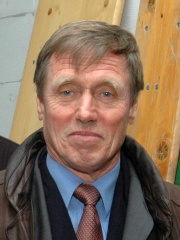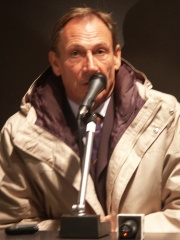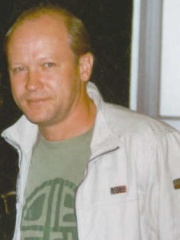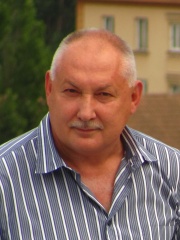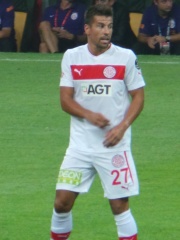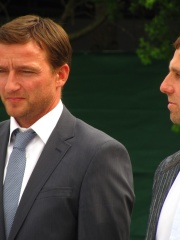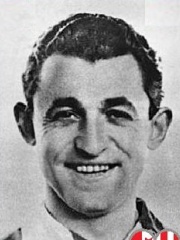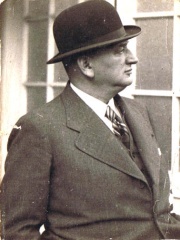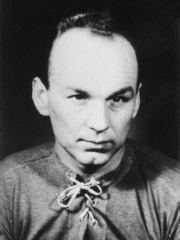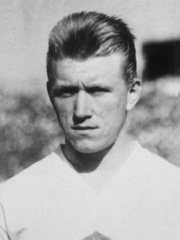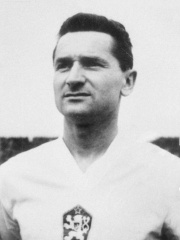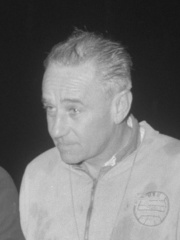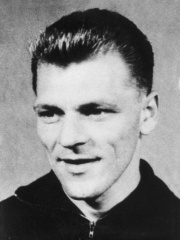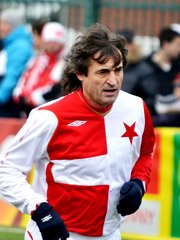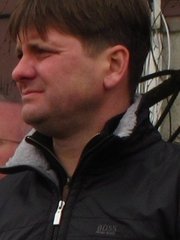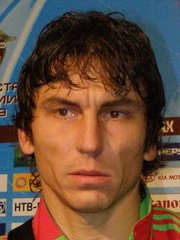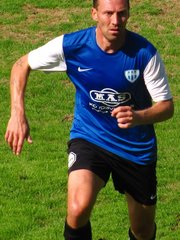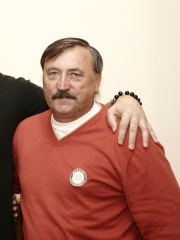
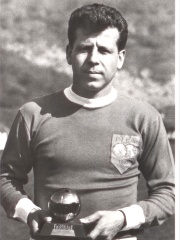
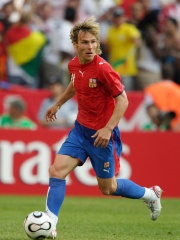
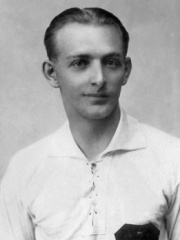
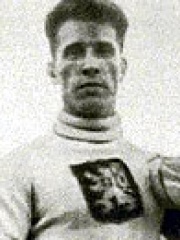
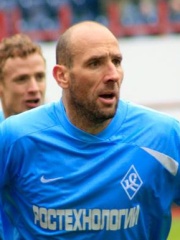
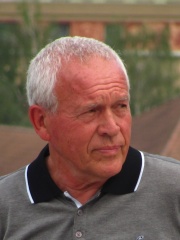
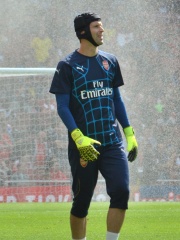
The Most Famous
SOCCER PLAYERS from Czechia
This page contains a list of the greatest Czech Soccer Players. The pantheon dataset contains 21,273 Soccer Players, 271 of which were born in Czechia. This makes Czechia the birth place of the 15th most number of Soccer Players behind Belgium, and Serbia.
Top 10
The following people are considered by Pantheon to be the top 10 most legendary Czech Soccer Players of all time. This list of famous Czech Soccer Players is sorted by HPI (Historical Popularity Index), a metric that aggregates information on a biography's online popularity. Visit the rankings page to view the entire list of Czech Soccer Players.

1. Antonín Panenka (b. 1948)
With an HPI of 73.34, Antonín Panenka is the most famous Czech Soccer Player. His biography has been translated into 45 different languages on wikipedia.
Antonín Panenka (born 2 December 1948) is a Czech former professional footballer who played as an attacking midfielder. He spent most of his career at Czechoslovak club Bohemians Prague before having spells with various Austrian clubs including Rapid Wien. Panenka won UEFA Euro 1976 with Czechoslovakia and gained recognition for his winning penalty kick in the shoot-out of the final against West Germany where he scored with a softly-chipped ball up the middle of the goal as the goalkeeper dived away. This style of penalty is now known as a panenka. In 1980, he won Czechoslovak Footballer of the Year and his team finished third at Euro 1980.

2. Josef Masopust (1931 - 2015)
With an HPI of 72.82, Josef Masopust is the 2nd most famous Czech Soccer Player. His biography has been translated into 47 different languages.
Josef Masopust (9 February 1931 – 29 June 2015) was a Czech football player and coach. He played as midfielder and was a key player for Czechoslovakia, helping them reach the 1962 FIFA World Cup Final. He was capped 63 times, scoring ten goals for his national team. He was named European Footballer of the Year in 1962. In November 2003, to celebrate UEFA's Jubilee, Masopust was selected as his country's Golden Player by the Football Association of the Czech Republic as their most outstanding player of the past 50 years. He was named by Pelé as one of the top 125 greatest living footballers in March 2004. He is regarded as one of the greatest midfielders of all time.

3. Pavel Nedvěd (b. 1972)
With an HPI of 69.66, Pavel Nedvěd is the 3rd most famous Czech Soccer Player. His biography has been translated into 58 different languages.
Pavel Nedvěd (Czech pronunciation: [ˈpavɛl ˈnɛdvjɛt] ; born 30 August 1972) is a Czech former professional footballer who played as a midfielder. He is widely regarded as one of the greatest Czech players of all time and he won numerous trophies with Italian clubs Lazio and Juventus. He won the last ever Cup Winners' Cup with Lazio and led Juventus to the 2003 UEFA Champions League final. Nedvěd was a vital player in the Czech team that reached the final of Euro 1996, after which he attracted the attention of big European clubs. He also captained the team at UEFA Euro 2004, where they were defeated in the semi-final by eventual champions Greece, and Nedvěd was named in the Team of the Tournament. Furthermore, Nedvěd helped his team qualify for the 2006 FIFA World Cup for the first time since the breakup of Czechoslovakia. Due to his quick and energetic runs during matches, Nedvěd was nicknamed "Furia Ceca" (lit. 'Czech Fury') by Italian football fans. His nickname in Czech is Méďa (lit. 'Little Bear'), stemming from the similarity between his surname and the Czech word for bear, Medvěd. Winning the Ballon d'Or in 2003, Nedvěd was the second Czech player to win the award and the first since the breakup of Czechoslovakia. During his career, Nedvěd received many other individual awards, including the second Golden Foot award in 2004, Czech Footballer of the Year (four times), and the Golden Ball (six times). He was also named by Pelé as one of the FIFA 100 and was named in the UEFA Team of the Year in 2003, 2004, and 2005. Nedvěd retired from professional football after the 2008–09 season. Nedvěd played 501 league matches at club level (scoring 110 goals) and was capped 91 times for the Czech Republic (scoring 18 goals).

4. Matthias Sindelar (1903 - 1939)
With an HPI of 69.55, Matthias Sindelar is the 4th most famous Czech Soccer Player. His biography has been translated into 35 different languages.
Matthias Sindelar (German: [maˈtiːas ˈʃɪndəlaːɐ̯], Czech: Matěj Šindelář; 10 February 1903 – 23 January 1939) was an Austrian professional footballer. Regarded as one of the greatest Austrian players of all time, Sindelar notably played for Austria Vienna and the national side. He played as a centre-forward for the celebrated Austrian national side of the early 1930s that became known as the Wunderteam, which he captained at the 1934 World Cup. Known as "The Mozart of football" or Der Papierene ("The Paper Man") for his slight build, he was renowned as one of the finest pre-war footballers, known for his fantastic dribbling ability and creativity. He was voted the best Austrian footballer of the 20th Century in a 1999 poll by the International Federation of Football History and Statistics (IFFHS) and was named Austria's sportsman of the century a year before. With the Wunderteam, Sindelar was one of the key elements of their developing formation and style of play as it evolved into a 2-3-5. According to specialists like Paul Dietschy, this formation provided "such fluidity to the Austrian system", leading to its earning the nickname of "the Viennese whirlpool". Although the Wunderteam regularly lacked efficiency, Sindelar's individual technical skill and vision often compensated for these issues.
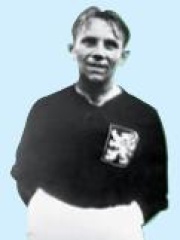
5. Oldřich Nejedlý (1909 - 1990)
With an HPI of 69.25, Oldřich Nejedlý is the 5th most famous Czech Soccer Player. His biography has been translated into 41 different languages.
Oldřich Nejedlý (26 December 1909 – 11 June 1990) was a Czech footballer. He spent his entire professional career at Sparta Prague as an inside-forward. Nejedlý was the top goalscorer of the 1934 FIFA World Cup at international level. He died in 1990 at the age of 80 during the FIFA World Cup of said year, a tournament which took place in Italy after the 1934 edition.

6. František Plánička (1904 - 1996)
With an HPI of 67.18, František Plánička is the 6th most famous Czech Soccer Player. His biography has been translated into 32 different languages.
František Plánička (Czech pronunciation: [ˈfraɲcɪʃɛk ˈplaːɲɪtʃka]; 2 June 1904 – 20 July 1996) was a Czech football goalkeeper and one of the most honoured players in the history of Czechoslovak football. He played all his career for Slavia Prague, during which time the club won the Czech league eight times and the Mitropa Cup once. He also became a member of the Czechoslovakia national team, where his first success as a young goalkeeper was helping Czechoslovakia to become runner-up in the Central European International Cup 1931–32 and later became captain during the World Cup finals of 1934 (where the Czechoslovakia team finished second) and 1938. Plánička was a courageous player, to the extent that in Czechoslovakia's 1938 World Cup match against Brazil, he remained on the field despite having suffered a serious injury. This injury ended a career that saw him play a total of 1253 matches, in which he conceded only 1073 goals, an average of 0.86 goals per game. He was a goalkeeper of outstanding reflexes and shot-stopping abilities and was also characterized by his sportsmanship, never once being cautioned or sent off in his 20-year career. He was awarded the UNESCO International Fair Play Award in 1985. Regarded as one of the greatest goalkeepers of his generation, and of all time, in 1999, the IFFHS elected him the best Czech goalkeeper – as well as the sixth best in Europe and the ninth best overall – of the twentieth century. In 2003, he was cataloged as the greatest pre-war goalkeeper in Europe along with other notable keepers such as Ricardo Zamora and Gianpiero Combi.

7. Jan Koller (b. 1973)
With an HPI of 66.79, Jan Koller is the 7th most famous Czech Soccer Player. His biography has been translated into 49 different languages.
Jan Koller (Czech pronunciation: [ˈjan ˈkolɛr]; born 30 March 1973) is a Czech former professional footballer who played as a striker. He was noted for his height, strong physique and heading ability. He began his career at Sparta Prague, then moved to Belgium, where he became the Belgian First Division top scorer with Lokeren. He won the league championship twice with Anderlecht and the Belgian Golden Shoe. In 2001, he joined Borussia Dortmund, where he won the Bundesliga title in his first season and scored 73 goals in 167 official games over five campaigns. He moved frequently in his later career, with stops in France, Germany and Russia. Koller is the all-time top scorer for the Czech Republic national team, with 55 goals in 91 appearances in a decade-long career starting in 1999. He represented the nation at three UEFA European Championships and the 2006 FIFA World Cup.

8. Ivo Viktor (b. 1942)
With an HPI of 65.87, Ivo Viktor is the 8th most famous Czech Soccer Player. His biography has been translated into 37 different languages.
Ivo Viktor (born 21 May 1942) is a Czech former footballer who played as a goalkeeper. He played for Czechoslovakia, representing his country on 63 occasions between 1966 and 1977, taking part in the 1970 FIFA World Cup and winning the 1976 European Championship. Regarded as one of the best goalkeepers of his generation in Europe in his prime, he placed third in the 1976 Ballon d'Or, and was a five-time winner of the Czechoslovak Footballer of the Year award, and a two-time winner of the European Goalkeeper of the Year award.

9. Petr Čech (b. 1982)
With an HPI of 65.64, Petr Čech is the 9th most famous Czech Soccer Player. His biography has been translated into 71 different languages.
Petr Čech (Czech pronunciation: [pɛtr̩ ˈtʃɛx] ; born 20 May 1982) is a Czech former professional footballer who played as a goalkeeper and current ice hockey goaltender playing for the Haringey Huskies of the NIHL South Division 2. He has been described as one of the greatest goalkeepers of all time, and, by some, as the greatest goalkeeper, alongside Peter Schmeichel, in Premier League history. Čech began his senior career at Chmel Blšany in 1999, where he played sporadically for two seasons prior to relocating to Sparta Prague in 2001. At age 19, Čech became a first team regular, and his single campaign with the club saw him register a league record of not conceding a goal in 903 competitive minutes. This led to his first move abroad, when he relocated to France to join Ligue 1 side Rennes for a fee of €5.5 million (£3.9 million) in 2002. In France, Čech starred in an under-performing team, and was the subject of a then club-record transfer for a goalkeeper when he moved to Premier League side Chelsea for a fee of £7 million (€9.8 million) in 2004. In his eleven-year spell at Chelsea, Čech made 494 appearances in all competitions, making him the club's seventh most capped player of all time. He also helped the club win four Premier League titles, four FA Cups, three League Cups, one UEFA Champions League title, and one UEFA Europa League title. Čech also holds Chelsea's all-time record for clean sheets, with 228. Čech departed Chelsea in 2015 to join city rivals Arsenal for a fee of £10 million, where he won another FA Cup before retiring in 2019. A Czech international, Čech made his debut with the Czech Republic in 2002, and is the most capped player in the history of the Czech national team, with 124 caps. He represented his country at the 2006 World Cup, as well as the 2004, 2008, 2012, and 2016 European Championships. He was voted into the Euro 2004 All-Star team after helping the Czechs reach the semi-finals, and served as the team's captain, prior to retiring from international competition in 2016. Čech also holds the record for the most Czech Footballer of the Year and Czech Golden Ball wins. Čech holds a number of goalkeeping records, including the Premier League record for fewest appearances required to reach 100 clean sheets, having done so in 180 appearances, the most clean sheets in a season (24), as well as the record for the most clean sheets in Premier League history (202). Čech is also the only goalkeeper to have won the Premier League Golden Glove with two separate clubs, and has won it a joint record four times; in the 2004–05, 2009–10, 2013–14 and the 2015–16 seasons. He was voted the IFFHS World's Best Goalkeeper in 2005, received the award of Best Goalkeeper in the 2004–05, 2006–07 and 2007–08 editions of the UEFA Champions League, and went 1,025 minutes without conceding a goal in the 2004–05 season, a league record. He has the third most clean sheets since 2000 among all goalkeepers.
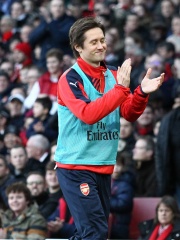
10. Tomáš Rosický (b. 1980)
With an HPI of 65.36, Tomáš Rosický is the 10th most famous Czech Soccer Player. His biography has been translated into 59 different languages.
Tomáš Rosický (Czech pronunciation: [ˈtomaːʃ ˈrosɪtskiː]; born 4 October 1980) is a Czech former professional footballer who was the captain of the Czech Republic national team for a ten-year period. He played club football for Sparta Prague, Borussia Dortmund and Arsenal. Currently, he serves as the sports director of Sparta Prague. A midfielder, he started his professional career at his hometown club Sparta Prague, playing three seasons in the Czech First League before moving to Borussia Dortmund in 2001 for DM 25 million (approximately £8 million), at the time a record transfer fee paid by a Bundesliga club. In his first season in Germany, he helped his team win the league title and reach the 2002 UEFA Cup Final. Rosický joined Arsenal in 2006, and made 247 appearances for the club, including appearing in their victory in the 2014 FA Cup Final. He spent a total of ten seasons in the Premier League, affected by several long-term injuries. Internationally, Rosický made his debut for the Czech Republic in 2000 and became captain of his country in 2006. He has taken part in four UEFA European Championships as well as the 2006 FIFA World Cup. He earned his 100th cap on 12 June 2015. Rosický is the Czech Republic's fourth highest goalscorer of all time.
People
Pantheon has 271 people classified as Czech soccer players born between 1881 and 2003. Of these 271, 212 (78.23%) of them are still alive today. The most famous living Czech soccer players include Antonín Panenka, Pavel Nedvěd, and Jan Koller. The most famous deceased Czech soccer players include Josef Masopust, Matthias Sindelar, and Oldřich Nejedlý. As of April 2024, 35 new Czech soccer players have been added to Pantheon including Jan Stejskal, Ivo Knoflíček, and Dušan Uhrin Jr..
Living Czech Soccer Players
Go to all RankingsAntonín Panenka
1948 - Present
HPI: 73.34
Pavel Nedvěd
1972 - Present
HPI: 69.66
Jan Koller
1973 - Present
HPI: 66.79
Ivo Viktor
1942 - Present
HPI: 65.87
Petr Čech
1982 - Present
HPI: 65.64
Tomáš Rosický
1980 - Present
HPI: 65.36
Sigfried Held
1942 - Present
HPI: 64.59
Zdeněk Zeman
1947 - Present
HPI: 63.65
Ivan Hašek
1963 - Present
HPI: 61.46
Zdeněk Nehoda
1952 - Present
HPI: 61.13
Milan Baroš
1981 - Present
HPI: 61.11
Karel Poborský
1972 - Present
HPI: 61.03
Deceased Czech Soccer Players
Go to all RankingsJosef Masopust
1931 - 2015
HPI: 72.82
Matthias Sindelar
1903 - 1939
HPI: 69.55
Oldřich Nejedlý
1909 - 1990
HPI: 69.25
František Plánička
1904 - 1996
HPI: 67.18
Antonín Puč
1907 - 1988
HPI: 64.65
Hugo Meisl
1881 - 1937
HPI: 64.13
Viliam Schrojf
1931 - 2007
HPI: 64.12
Josef Jelínek
1941 - 2024
HPI: 63.99
Josef Kadraba
1933 - 2019
HPI: 63.26
Jiří Sobotka
1911 - 1994
HPI: 62.07
Svatopluk Pluskal
1930 - 2005
HPI: 61.16
Ladislav Novák
1931 - 2011
HPI: 60.99
Newly Added Czech Soccer Players (2025)
Go to all RankingsJan Stejskal
1962 - Present
HPI: 47.17
Ivo Knoflíček
1962 - Present
HPI: 47.11
Dušan Uhrin Jr.
1967 - Present
HPI: 45.96
Martin Kotůlek
1969 - Present
HPI: 43.73
Marek Čech
1976 - Present
HPI: 42.78
Jan Šimák
1978 - Present
HPI: 41.69
Jan Kuchta
1997 - Present
HPI: 38.81
David Jurásek
2000 - Present
HPI: 38.68
Jiří Novotný
1983 - Present
HPI: 38.18
Pavel Novotný
1973 - Present
HPI: 38.17
Ladislav Krejčí
1999 - Present
HPI: 37.69
Filip Nguyen
1992 - Present
HPI: 37.35
Overlapping Lives
Which Soccer Players were alive at the same time? This visualization shows the lifespans of the 25 most globally memorable Soccer Players since 1700.

